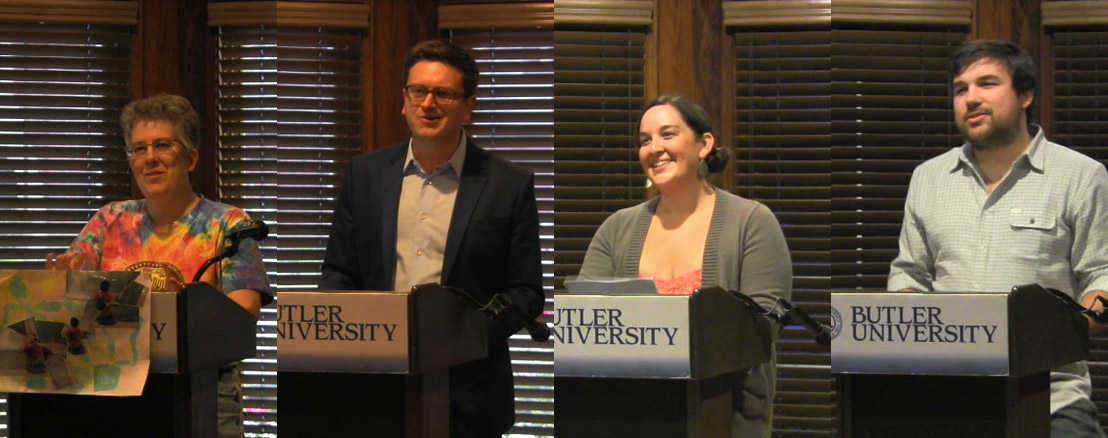 Dialogue, Butler’s extracurricular, student-run workshop, hosted A Midsummer Night’s Reading 2: Electric Much Ado at the Efroymson Center for Creative Writing on Saturday, Aug. 17. Five readers entertained an intimate audience with a surprisingly evenly-distributed mix of poetry, fiction and non-. The participants were (from left to right) Tracy Mishkin, Chris Speckman, Mallory Matyk, Zach Roth, as well as (conveniently not pictured) Luke Wortley.
Dialogue, Butler’s extracurricular, student-run workshop, hosted A Midsummer Night’s Reading 2: Electric Much Ado at the Efroymson Center for Creative Writing on Saturday, Aug. 17. Five readers entertained an intimate audience with a surprisingly evenly-distributed mix of poetry, fiction and non-. The participants were (from left to right) Tracy Mishkin, Chris Speckman, Mallory Matyk, Zach Roth, as well as (conveniently not pictured) Luke Wortley.
Tracy’s no stranger to Dialogue readings; I think this was her second, maybe third go behind the illustrious podium. Our audiences fall quickly for her plainspoken poetry, its mix of sardonic wit and sardonic weight. And her sardonic introductions. Really, she just sort of oozes a straight essence of sardony.
Chris Speckman is one of a few alums still participating in Dialogue after graduation. A dirty traitor of the worst sort, he’s eschewed his prose background in favor of more and more copious amounts of poetry. I’ll forgive it, though, because he has a nifty way with word choice and dresses sharp.
This reading was Mallory’s last adventure with Dialogue, as she’s moved away to Chi-town. Her CNF and memoirs are always a hoot. She’s never afraid to embarrass herself a little if it tells a good story. If I recall correctly, she shared the beginnings of her fireman fetish that night?
While we had a couple veterans up on the podium, it was Luke’s first reading. Period. He looked a little nervous, but once he started reading, a new story about rural Kentucky and ghosts, y’know, just regular stuff, the audience were quickly held in rapt attention.
I also read, but jeez, I’ve read three times now. I’m just hogging valuable reading slots at this point. Which is precisely why you should email me (zach.e.roth at gmail.com) and claim a spot at Dialogue’s next reading on Sunday, October 27! It’s Halloween-themed, and readers can either bring work from an admired author, a spin a scary yarn of their own.


